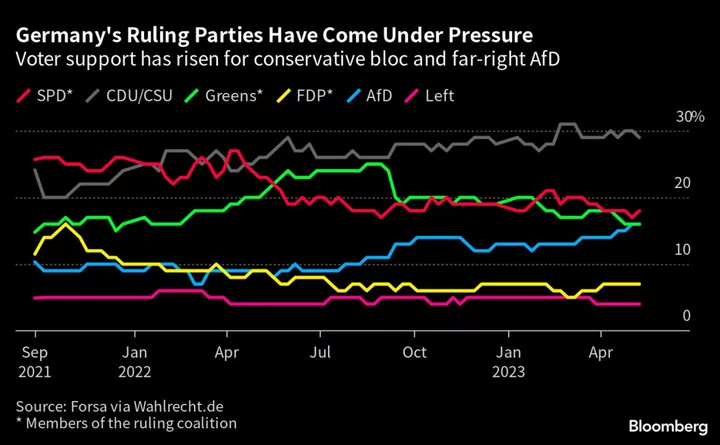Chancellor Olaf Scholz’s Social Democrats retained control of the city-state of Bremen, ending a string of setbacks in regional elections for the German leader’s party.
Led by the popular incumbent, Mayor Andreas Bovenschulte, the SPD won 29.4% in Sunday’s vote in the smallest of Germany’s 16 states, defeating the conservative Christian Democrats who were second on 25.7%, according to preliminary results from public broadcaster ARD.
“What a day! what a result!,” Bovenschulte told supporters after the SPD increased its support by nearly five points compared with the last election in 2019. “We fought a hard election campaign together and it paid off. We are the No. 1 in Bremen!”
The biggest losers were the Greens, who slumped nearly five points to 12.7%. A junior partner in Scholz’s national coalition has been struggling with a series of challenges. Many voters are concerned about the cost of climate-protection measures such as a transition to heat pumps, while the party has also faced allegations of nepotism centered on the Economy Ministry — run by Robert Habeck, the vice chancellor and former Greens co-leader.
Read more: Germany’s Greens Head for Electoral Setback in Regional Vote
Bovenschulte has indicated he’s keen to continue running the city-state, which includes the port of Bremerhaven, in a coalition with the Greens and the Left party, which won 10.6%. A so-called “grand coalition” with the CDU is also a possibility.
SPD General Secretary Kevin Kuehnert said it was up to the Bremen branch of the party to decide which parties to explore a coalition with, adding that the key point is that Bovenschulte will remain mayor.
“For us it’s important that we achieved our election goal, which was to increase our share of the vote and become the strongest party,” Kuehnert said on ARD from Berlin.
For the SPD and Scholz, success in Bremen is a degree of respite after it surrendered control of Berlin with its worst-ever result earlier this year. The center-left party also stumbled in regional ballots last year in North Rhine-Westphalia and Schleswig-Holstein.
On a national level, support for the Social Democrats has steadily eroded since the 2021 election that the party narrowly won. In recent polls, the SPD has been trailing the CDU-led conservative bloc by more than 10 percentage points.
Andreas Jung, a deputy CDU chairman, said Bovenschulte’s personal popularity had been the key factor in the SPD’s victory.
“As a traditional SPD stronghold, Bremen is always a difficult place for the CDU,” Jung told ARD, characterizing the performance as “respectable.”
The pro-business Free Democrats — the smallest member of the ruling coalition in Berlin — lost support in Bremen and have slumped in national polls. The Greens are coming off highs and support is neck and neck with the far-right Alternative for Germany, or AfD.
The anti—immigrant party — which won 6% of the vote in Bremen in 2019 — was disqualified from Sunday’s election. Because of internal squabbling, it breached electoral rules by submitting two competing lists of candidates.
The party’s absence helped local protest party Buerger im Wut — Citizens in Rage — which got 10.1% of the vote.
--With assistance from Michael Nienaber.
(Updates with preliminary figures throughout)

